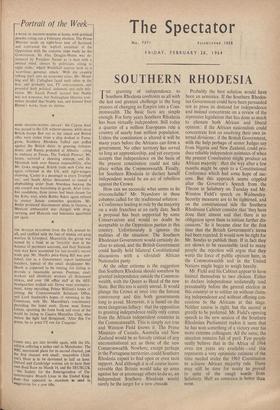SOUTHERN RHODESIA
"-r- HE granting of independence to I Southern Rhodesia confronts us all with the last and greatest challenge in the long process of changing an Empire into a Com- monwealth. The basic facts are simple enough. For forty years Southern Rhodesia has been virtually independent. Still today a quarter of a million Europeans rule a country of nearly four million population. Unless the constitution is altered it will be many years before the Africans can fdrm a government. No other territory has served so long an apprenticeship, and yet everyone accepts that independence on the basis of the present constitution could not take place within the Commonwealth. Finally, for Southern Rhodesia to declare herself independent would be an act of rebellion against the Crown. How can we reconcile what• seems to be irreconcilable? Mr. Nyandoro in these columns called for the traditional solution : a Conference leading to rule by the majority on a wide franchise at an early date. Such a proposal has been supported by some Conservatives and would no doubt be acceptable to the Opposition parties in this country. Unfortunately it ignores the realities of the situation. The Southern Rhodesian Government would certainly de- cline to attend, and the British Government could hardly hold bilateral Constitutional discussions with a (divided) African Nationalist party. At the other extreme is the suggestion that Southern Rhodesia should somehow be granted independence outside the Common- wealth, with the Queen as Head of the new State. But this too is surely unreal. It would plunge the Crown at once into the fiercest controversy and this both governments long to avoid. Moreover, it is based on the most dangerous fallacy : that the opposition to granting independence really only comes from the African independent countries in the Commonwealth. This is simply not true and Winston Field knows it. The Prime Ministers of Canada, Australia and New Zealand would be as fiercely critical of any unconstitutional act as those of the new Commonwealth. Nowhere, except perhaps in the Portuguese territories, could Southern Rhodesia expect to find open or even tacit support. And although it is of course incon- ceivable that Britain would take up arms against her or encourage others to do so, an independent Southern Rhodesia would surely be the target for a new crusade. Probably the best solution would have been an armistice. If the Southern Rhodes- ian Government could have been persuaded not to press its demand for independence and instead concentrate on a review of the repressive legislation that has done so much to alienate both African and liberal opinion : if the African nationalists could concentrate first on resolving their own in- ternal divisions : if the British Government, with the help perhaps of senior Judges say from Nigeria and New Zealand, could pro- duce reliable independent estimates of when the present Constitution might produce an African majority : then the way after a few months might be open to a Constitutional Conference which had some hope of suc- cess. But this approach seems crippled after the Governor's Speech from the Throne in Salisbury on Tuesday and Mr. Winston Field's speech on Wednesday. Security measures are to be tightened, and on the constitutional side the Southern Rhodesian Cabinet consider that 'they have done their utmost and that there is no obligation upon them to initiate further dis- cussions.' So it became clear for the first time that the British Government's terms had been rejected. It would now be right for Mr. Sandys to publish them. If in fact they are shown to be reasonable (and to many people the rejection will argue that they were) the force of public opinion here, in the Commonwealth and in the United Nations might begin to weigh heavily.
Mr. Field and his Cabinet appear to have limited themselves to two choices. Either to declare independence unilaterally (and presumably before the general election in this country) or to soldier on without claim- ing independence and without offering con- cessions to the Africans at this stage. Neither course is right, but the second is greatly to be preferred. Mr. Field's opening speech to the new session of the Southern Rhodesian Parliament makes it seem that he has won something of a victory over his more extreme colleagues. All the same, the situation remains full of peril. Few people really believe that in the Africa of 1964 even ten years are available—and this represents a very optimistic estimate of the time needed under the 1961 Constitution to achieve African majority rule. There may still be time for sanity to prevail in spite of the rough words from Salisbury. Half an armistice is better than none.


































 Previous page
Previous page